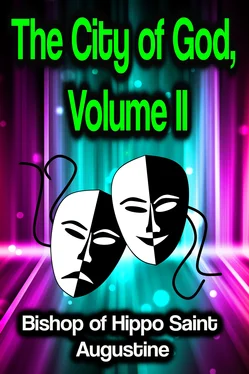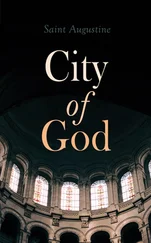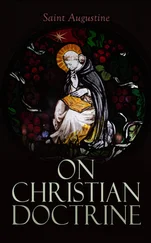Saint Augustine - The City of God, Volume II
Здесь есть возможность читать онлайн «Saint Augustine - The City of God, Volume II» — ознакомительный отрывок электронной книги совершенно бесплатно, а после прочтения отрывка купить полную версию. В некоторых случаях можно слушать аудио, скачать через торрент в формате fb2 и присутствует краткое содержание. Жанр: unrecognised, на английском языке. Описание произведения, (предисловие) а так же отзывы посетителей доступны на портале библиотеки ЛибКат.
- Название:The City of God, Volume II
- Автор:
- Жанр:
- Год:неизвестен
- ISBN:нет данных
- Рейтинг книги:4 / 5. Голосов: 1
-
Избранное:Добавить в избранное
- Отзывы:
-
Ваша оценка:
- 80
- 1
- 2
- 3
- 4
- 5
The City of God, Volume II: краткое содержание, описание и аннотация
Предлагаем к чтению аннотацию, описание, краткое содержание или предисловие (зависит от того, что написал сам автор книги «The City of God, Volume II»). Если вы не нашли необходимую информацию о книге — напишите в комментариях, мы постараемся отыскать её.
The City of God, Volume II — читать онлайн ознакомительный отрывок
Ниже представлен текст книги, разбитый по страницам. Система сохранения места последней прочитанной страницы, позволяет с удобством читать онлайн бесплатно книгу «The City of God, Volume II», без необходимости каждый раз заново искать на чём Вы остановились. Поставьте закладку, и сможете в любой момент перейти на страницу, на которой закончили чтение.
Интервал:
Закладка:
24. That if men had remained innocent and obedient in Paradise, the generative organs should have been in subjection to the will as the other members are.
The man, then, would have sown the seed, and the woman received it, as need required, the generative organs being moved by the will, not excited by lust. For we move at will not only those members which are furnished with joints of solid bone, as the hands, feet, and fingers, but we move also at will those which are composed of slack and soft nerves: we can put them in motion, or stretch them out, or bend and twist them, or contract and stiffen them, as we do with the muscles of the mouth and face. The lungs, which are the very tenderest of the viscera except the brain, and are therefore carefully sheltered in the cavity of the chest, yet for all purposes of inhaling and exhaling the breath, and of uttering and modulating the voice, are obedient to the will when we breathe, exhale, speak, shout, or sing, just as the bellows obey the smith or the organist. I will not press the fact that some animals have a natural power to move a single spot of the skin with which their whole body is covered, if they have felt on it anything they wish to drive off,—a power so great, that by this shivering tremor of the skin they can not only shake off flies that have settled on them, but even spears that have fixed in their flesh. Man, it is true, has not this power; but is this any reason for supposing that God could not give it to such creatures as He wished to possess it? And therefore man himself also might very well have enjoyed absolute power over his members had he not forfeited it by his disobedience; for it was not difficult for God to form him so that what is now moved in his body only by lust should have been moved only at will.
We know, too, that some men are differently constituted from others, and have some rare and remarkable faculty of doing with their body what other men can by no effort do, and, indeed, scarcely believe when they hear of others doing. There are persons who can move their ears, either one at a time, or both together. There are some who, without moving the head, can bring the hair down upon the forehead, and move the whole scalp backwards and forwards at pleasure. Some, by lightly pressing their stomach, bring up an incredible quantity and variety of things they have swallowed, and produce whatever they please, quite whole, as if out of a bag. Some so accurately mimic the voices of birds and beasts and other men, that, unless they are seen, the difference cannot be told. Some have such command of their bowels, that they can break wind continuously at pleasure, so as to produce the effect of singing. I myself have known a man who was accustomed to sweat whenever he wished. It is well known that some weep when they please, and shed a flood of tears. But far more incredible is that which some of our brethren saw quite recently. There was a presbyter called Restitutus, in the parish of the Calamensian [121]Church, who, as often as he pleased (and he was asked to do this by those who desired to witness so remarkable a phenomenon), on some one imitating the wailings of mourners, became so insensible, and lay in a state so like death, that not only had he no feeling when they pinched and pricked him, but even when fire was applied to him, and he was burned by it, he had no sense of pain except afterwards from the wound. And that his body remained motionless, not by reason of his self-command, but because he was insensible, was proved by the fact that he breathed no more than a dead man; and yet he said that, when any one spoke with more than ordinary distinctness, he heard the voice, but as if it were a long way off. Seeing, then, that even in this mortal and miserable life the body serves some men by many remarkable movements and moods beyond the ordinary course of nature, what reason is there for doubting that, before man was involved by his sin in this weak and corruptible condition, his members might have served his will for the propagation of offspring without lust? Man has been given over to himself because he abandoned God, while he sought to be self-satisfying; and disobeying God, he could not obey even himself. Hence it is that he is involved in the obvious misery of being unable to live as he wishes. For if he lived as he wished, he would think himself blessed; but he could not be so if he lived wickedly.
25. Of true blessedness, which this present life cannot enjoy.
However, if we look at this a little more closely, we see that no one lives as he wishes but the blessed, and that no one is blessed but the righteous. But even the righteous himself does not live as he wishes, until he has arrived where he cannot die, be deceived, or injured, and until he is assured that this shall be his eternal condition. For this nature demands; and nature is not fully and perfectly blessed till it attains what it seeks. But what man is at present able to live as he wishes, when it is not in his power so much as to live? He wishes to live, he is compelled to die. How, then, does he live as he wishes who does not live as long as he wishes? or if he wishes to die, how can he live as he wishes, since he does not wish even to live? Or if he wishes to die, not because he dislikes life, but that after death he may live better, still he is not yet living as he wishes, but only has the prospect of so living when, through death, he reaches that which he wishes. But admit that he lives as he wishes, because he has done violence to himself, and forced himself not to wish what he cannot obtain, and to wish only what he can (as Terence has it, "Since you cannot do what you will, will what you can" [122]), is he therefore blessed because he is patiently wretched? For a blessed life is possessed only by the man who loves it. If it is loved and possessed, it must necessarily be more ardently loved than all besides; for whatever else is loved must be loved for the sake of the blessed life. And if it is loved as it deserves to be,—and the man is not blessed who does not love the blessed life as it deserves,—then he who so loves it cannot but wish it to be eternal. Therefore it shall then only be blessed when it is eternal.
26. That we are to believe that in Paradise our first parents begat offspring without blushing.
In Paradise, then, man lived as he desired so long as he desired what God had commanded. He lived in the enjoyment of God, and was good by God's goodness; he lived without any want, and had it in his power so to live eternally. He had food that he might not hunger, drink that he might not thirst, the tree of life that old age might not waste him. There was in his body no corruption, nor seed of corruption, which could produce in him any unpleasant sensation. He feared no inward disease, no outward accident. Soundest health blessed his body, absolute tranquillity his soul. As in Paradise there was no excessive heat or cold, so its inhabitants were exempt from the vicissitudes of fear and desire. No sadness of any kind was there, nor any foolish joy; true gladness ceaselessly flowed from the presence of God, who was loved "out of a pure heart, and a good conscience, and faith unfeigned." [123]The honest love of husband and wife made a sure harmony between them. Body and spirit worked harmoniously together, and the commandment was kept without labour. No languor made their leisure wearisome; no sleepiness interrupted their desire to labour. [124]In tanta facilitate rerum et felicitate hominum, absit ut suspicemur, non potuisse prolem seri sine libidinis morbo: sed eo voluntatis nutu moverentur illa membra quo cætera, et sine ardoris illecebroso stimulo cum tranquillitate animi et corporis nulla corruptione integritatis infunderetur gremio maritus uxoris. Neque enim quia experientia probari non potest, ideo credendum non est; quando illas corporis partes non ageret turbidus calor, sed spontanea potestas, sicut opus esset, adhiberet; ita tunc potuisse utero conjugis salva integritate feminei genitalis virile semen immitti, sicut nunc potest eadem integritate salva ex utero virginis fluxus menstrui cruoris emitti. Eadem quippe via posset illud injici, qua hoc potest ejici. Ut enim ad pariendum non doloris gemitus, sed maturitatis impulsus feminea viscera relaxaret: sic ad fœtandum et concipiendum non libidinis appetitus, sed voluntarius usus naturam utramque conjungeret. We speak of things which are now shameful, and although we try, as well as we are able, to conceive them as they were before they became shameful, yet necessity compels us rather to limit our discussion to the bounds set by modesty than to extend it as our moderate faculty of discourse might suggest. For since that which I have been speaking of was not experienced even by those who might have experienced it,—I mean our first parents (for sin and its merited banishment from Paradise anticipated this passionless generation on their part),—when sexual intercourse is spoken of now, it suggests to men's thoughts not such a placid obedience to the will as is conceivable in our first parents, but such violent acting of lust as they themselves have experienced. And therefore modesty shuts my mouth, although my mind conceives the matter clearly. But Almighty God, the supreme and supremely good Creator of all natures, who aids and rewards good wills, while He abandons and condemns the bad, and rules both, was not destitute of a plan by which He might people His city with the fixed number of citizens which His wisdom had foreordained even out of the condemned human race, discriminating them not now by merits, since the whole mass was condemned as if in a vitiated root, but by grace, and showing, not only in the case of the redeemed, but also in those who were not delivered, how much grace He has bestowed upon them. For every one acknowledges that he has been rescued from evil, not by deserved, but by gratuitous goodness, when he is singled out from the company of those with whom he might justly have borne a common punishment, and is allowed to go scathless. Why, then, should God not have created those whom He foresaw would sin, since He was able to show in and by them both what their guilt merited, and what His grace bestowed, and since, under His creating and disposing hand, even the perverse disorder of the wicked could not pervert the right order of things?
Читать дальшеИнтервал:
Закладка:
Похожие книги на «The City of God, Volume II»
Представляем Вашему вниманию похожие книги на «The City of God, Volume II» списком для выбора. Мы отобрали схожую по названию и смыслу литературу в надежде предоставить читателям больше вариантов отыскать новые, интересные, ещё непрочитанные произведения.
Обсуждение, отзывы о книге «The City of God, Volume II» и просто собственные мнения читателей. Оставьте ваши комментарии, напишите, что Вы думаете о произведении, его смысле или главных героях. Укажите что конкретно понравилось, а что нет, и почему Вы так считаете.












